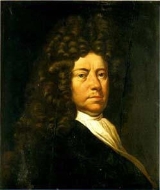
Otto Mencke
Encyclopedia
Otto Mencke was a 17th-century German
philosopher and scientist
. He obtained his doctorate at the University of Leipzig
in 1666 with a thesis entitled: Ex Theologia naturali — De Absoluta Dei Simplicitate, Micropolitiam, id est Rempublicam In Microcosmo Conspicuam.
He is notable as being the founder of the very first scientific journal in Germany, established 1682, entitled: Acta Eruditorum
. He was a professor of moral philosophy at the University of Leipzig
, but is more famous for his scientific genealogy that produced a fine lineage of mathematicians that includes notables such as Carl Friedrich Gauss
and David Hilbert
.
The Mathematics Genealogy Project
database records as many as 49,890 mathematicians and other scientists in his lineage. The Philosophy Family Tree records 535 philosophers in his lineage .
Isaac Newton
and Mencke were in correspondence in 1693.
Germany
Germany , officially the Federal Republic of Germany , is a federal parliamentary republic in Europe. The country consists of 16 states while the capital and largest city is Berlin. Germany covers an area of 357,021 km2 and has a largely temperate seasonal climate...
philosopher and scientist
Scientist
A scientist in a broad sense is one engaging in a systematic activity to acquire knowledge. In a more restricted sense, a scientist is an individual who uses the scientific method. The person may be an expert in one or more areas of science. This article focuses on the more restricted use of the word...
. He obtained his doctorate at the University of Leipzig
University of Leipzig
The University of Leipzig , located in Leipzig in the Free State of Saxony, Germany, is one of the oldest universities in the world and the second-oldest university in Germany...
in 1666 with a thesis entitled: Ex Theologia naturali — De Absoluta Dei Simplicitate, Micropolitiam, id est Rempublicam In Microcosmo Conspicuam.
He is notable as being the founder of the very first scientific journal in Germany, established 1682, entitled: Acta Eruditorum
Acta Eruditorum
Acta Eruditorum was the first scientific journal of the German lands, published from 1682 to 1782....
. He was a professor of moral philosophy at the University of Leipzig
University of Leipzig
The University of Leipzig , located in Leipzig in the Free State of Saxony, Germany, is one of the oldest universities in the world and the second-oldest university in Germany...
, but is more famous for his scientific genealogy that produced a fine lineage of mathematicians that includes notables such as Carl Friedrich Gauss
Carl Friedrich Gauss
Johann Carl Friedrich Gauss was a German mathematician and scientist who contributed significantly to many fields, including number theory, statistics, analysis, differential geometry, geodesy, geophysics, electrostatics, astronomy and optics.Sometimes referred to as the Princeps mathematicorum...
and David Hilbert
David Hilbert
David Hilbert was a German mathematician. He is recognized as one of the most influential and universal mathematicians of the 19th and early 20th centuries. Hilbert discovered and developed a broad range of fundamental ideas in many areas, including invariant theory and the axiomatization of...
.
The Mathematics Genealogy Project
Mathematics Genealogy Project
The Mathematics Genealogy Project is a web-based database for the academic genealogy of mathematicians. As of September, 2010, it contained information on approximately 145,000 mathematical scientists who contribute to "research-level mathematics"...
database records as many as 49,890 mathematicians and other scientists in his lineage. The Philosophy Family Tree records 535 philosophers in his lineage .
Isaac Newton
Isaac Newton
Sir Isaac Newton PRS was an English physicist, mathematician, astronomer, natural philosopher, alchemist, and theologian, who has been "considered by many to be the greatest and most influential scientist who ever lived."...
and Mencke were in correspondence in 1693.

